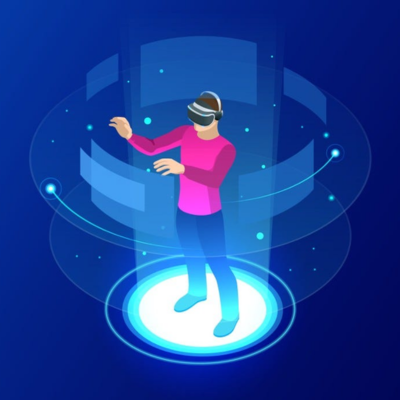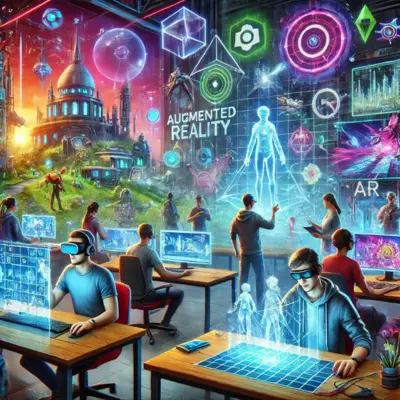How The Walking Dead AR Blends Fiction and Reality: A Deep Dive into Augmented Reality Gaming
Augmented Reality (AR) is not just a trend, it’s a revolution in the gaming industry. It’s creating immersive experiences that blur the lines between real and virtual worlds. One of the most successful and innovative examples is The Walking Dead: Our World, an AR game that takes players into the zombie apocalypse of The Walking Dead series. Through the integration of AR, players can interact with zombies, missions, and characters from the series in their real-world environments. This blend of fiction and Reality deepens player engagement and sets a new standard for AR in gaming.
This blog will explore how The Walking Dead: Our World utilizes AR technology to create an immersive experience. We’ll break down the technical aspects of Augmented Reality game development, discuss its business implications, and examine the growing potential of AR beyond gaming. We will also highlight real-world examples, user testimonials, and practical advice for businesses looking to enter the AR market.
Start Your AR Game Project Today!

What is Augmented Reality (AR), and How Does It Work in Gaming?
At its core, AR enhances the real world by overlaying digital elements—such as 3D models, sound, and animations—on top of a live environment, as seen through a smartphone or AR device. Unlike Virtual Reality (VR), which transports users into an entirely digital world, AR blends physical surroundings with virtual components to create an interactive experience. In gaming, AR allows players to engage with virtual elements in real-world environments, providing a new level of immersion.
For example, in The Walking Dead: Our World, players can see zombies walking down their neighbourhood streets or outside their favourite coffee shop. The AR technology tracks real-world locations and superimposes 3D-rendered zombies into those spaces. Players then engage in battles and complete missions using their mobile devices.
Visual Example:
Imagine walking down a city street, phone in hand, and through the screen, you see a horde of zombies approaching from an alleyway. You aim your device to fight them off, collecting rewards that unlock new characters and missions. AR makes it feel like the zombie apocalypse has arrived at your doorstep.
Blending Fiction and Reality in The Walking Dead: Our World
The power of AR lies in its ability to merge fictional worlds with Reality, and The Walking Dead: Our World does this flawlessly. Using location-based technology, the game transforms real-world locations into settings for zombie battles. The player’s real-world surroundings—a park, city street, or suburban backyard—become the stage for survival missions against virtual enemies.
How AR Enhances Immersion:
- Real-World Integration: Players use their phones to navigate their physical environment while battling digital zombies that appear to “exist” in the real world. This creates a sense of urgency and realism.
- Familiar Characters: The game integrates beloved characters from The Walking Dead series, such as Rick, Michonne, and Daryl, who guide players through missions, creating a deep emotional connection to the experience. This connection keeps players engaged and invested in the game.
- Interactive Storylines: Story-driven missions are interwoven with real-world locations, enhancing the narrative experience. Players make choices that influence their progress, deepening the sense of agency and immersion.

Technical Aspects of Augmented Reality Game Development
Creating an immersive AR game like The Walking Dead: Our World requires a combination of advanced technology and creative expertise. Here’s a breakdown of some of the technical elements involved in Augmented Reality game development:
Location-Based Services
The game’s GPS and real-time location services access the player’s physical location and use that data to place zombies, missions, and other interactive elements in their immediate surroundings. This ensures every player’s experience is unique, depending on where they are in the real world, making them feel like the game is tailored just for them.
3D Modeling and Rendering
The game’s zombies, characters, and weapons are fully rendered in 3D, which requires highly detailed modelling and real-time rendering. The game adjusts the lighting and perspective of the 3D models to match the player’s physical environment, which demands substantial processing power and graphics optimization.
Augmented Reality SDKs and Platforms
AR games are built using AR software development kits (SDKs), such as Apple’s ARKit or Google’s ARCore. These platforms provide:
- The framework for creating AR experiences.
- Allowing developers to integrate real-time object recognition.
- Motion tracking.
- Environmental understanding.
User Interface and Interaction Design
Players use mobile devices to navigate both the physical and digital worlds. The interface needs to be responsive and intuitive, ensuring seamless interaction between real-world and digital environments—one of the core challenges augmented reality game developers face.
Multiplayer and Social Features
The game integrates multiplayer modes, allowing players to team up with friends or compete for global rankings. This social dimension enhances Engagement and replayability.
Business Benefits of Investing in AR Game Development
For businesses, the potential of AR gaming extends beyond the entertainment industry. Investing in AR game development can yield several key benefits:
Increased User Engagement
AR games create highly immersive experiences that capture users’ attention for extended periods. Owing to their novelty and interactivity, AR games often see higher user retention rates compared to traditional mobile games.
Innovative Marketing Opportunities
Businesses are using AR games as part of their marketing strategy. For example, a retail company could develop an AR game where players collect virtual items in real-world locations, driving foot traffic to stores. Partnering with an Augmented Reality game agency can help businesses create promotional AR experiences that boost brand loyalty.
Broader Market Appeal
While The Walking Dead AR focuses on entertainment, AR is used in retail, real estate, and healthcare industries. A real estate app could let buyers view 3D models of homes, or a healthcare company might use AR to simulate surgeries for medical training. Working with an Augmented Reality game consultancy can help businesses from various sectors tap into AR’s potential.

Case Study: The Success of The Walking Dead: Our World
Since its launch, The Walking Dead: Our World has seen millions of downloads and vital player engagement metrics. The game’s ability to blend real-world environments with fictional zombies has created a unique experience.
User Testimonials:
- Increased Engagement: “The game makes you feel like you’re in The Walking Dead universe. Walking around my neighbourhood and seeing zombies in my backyard is terrifying and exhilarating.”
- Unique Gameplay: “I love how every playthrough feels different. My friends in other cities have different experiences because the game’s location-based features change everything.”
Challenges in AR Game Development
While AR gaming has excellent potential, businesses and developers face several challenges:
Technical Limitations
AR requires substantial processing power and battery usage, limiting the types of devices capable of running AR games smoothly. Ensuring AR games perform well across various devices is critical for Augmented Reality game development firms.
Cost and Development Time
Building a high-quality AR game is resource-intensive and requires skilled AR game developers. However, as The Walking Dead AR demonstrated, the ROI often justifies the investment.
User Adoption and Hardware
AR still requires a certain level of tech-savvy from users. While it’s growing, it’s dependent on advanced hardware like AR glasses, which are not yet mainstream.
Real-World Applications of AR Beyond Gaming
Beyond gaming, AR technology is transforming industries like retail, real estate, and healthcare:
Retail:
AR lets customers virtually try on clothing or see how the furniture fits in their homes.
Real Estate:
AR allows homebuyers to view properties in 3D, offering virtual tours that are more immersive than traditional photos.
Healthcare:
In medical training, AR simulates surgeries, giving doctors and students hands-on experience in a risk-free environment.
Conclusion
Augmented Reality is transforming the gaming industry, and The Walking Dead: Our World is a perfect example of how fiction can blend with Reality to create immersive experiences. The game’s success lies in its technical implementation, intuitive interface, and emotional connection through familiar characters and storylines.
For businesses, AR presents opportunities across sectors. By investing in Augmented Reality game development, companies can create interactive experiences that engage users and drive ROI. Working with the right Augmented Reality game development company ensures the success of your AR project, whether it’s for gaming or other innovative uses.















